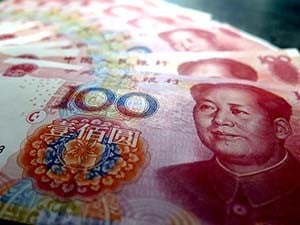China's central bank on Friday cut both Chinese interest rates and banks' reserve requirement ratio. It's an effort to boost China's slowing economy.
The People's Bank of China (PBOC) trimmed its benchmark lending and deposit rate by 0.25% each. They are now at 4.35% and 1.5%, respectively. Both will be effective Saturday. China's interest rates have now been cut six times since November 2014.
The cut in Chinese interest rates comes just days after China reported its slowest GDP growth rate since the Great Recession.
 Data released Monday showed China's economic growth rate was 6.9% in Q3. That was the first time it slipped below 7% since 2009. The slowing growth raised doubts that China will be able to reach its official target growth rate of 7% for the full year. China hasn't logged a full-year growth rate less than 7% in 25 years.
Data released Monday showed China's economic growth rate was 6.9% in Q3. That was the first time it slipped below 7% since 2009. The slowing growth raised doubts that China will be able to reach its official target growth rate of 7% for the full year. China hasn't logged a full-year growth rate less than 7% in 25 years.
That slowing growth has investors around the world taking notice...
The Chinese economy has been responsible for nearly one-third of all global growth over the past seven years.
With Chinese imports in September slipping for the 11th consecutive month, and producer prices stuck in deflation for three years, boosting China's economy won't be easy.
China's central bank is committed to stimulating growth, however. Here are the moves the PBOC has taken recently, including cutting Chinese interest rates...
Lowering Chinese Interest Rates Is Just One Strategy
- On Aug. 11, China's central bank unexpectedly allowed the yuan to trade more freely. The PBOC typically sets a daily 2% midpoint around which the yuan can rise and fall. But going forward, the midpoint will be based on the previous day's closing price.
- On Aug. 25, the PBOC cut its key lending rate 0.25% to 4.6%. That marked the fifth time China's central bank trimmed rates since last November. The PBOC also lowered the amount banks are required to hold in reserves, a move aimed to spur lending.
- On Sept. 8, China's finance ministry said the Asian nation would roll out a "more forceful" fiscal policy to stimulate its economy. The ministry said it will allocate more funds to support infrastructure projects and implement tax cuts for small businesses. It also said it would accelerate the approval process for duty-free stores to boost construction.
Despite the continued efforts, the China monetary policy moves have done nothing more than raise questions about the government's ability to effectively control the country's economy...
[mmpazkzone name="in-story" network="9794" site="307044" id="137008" type="4"]
Many economists say China is undergoing a major transformation. They maintain the Asian nation is transitioning from an economy sustained by investment to an economy powered by consumption. It's what Chinese officials are calling the "new normal." And it's a gigantic shift that comes with many challenges.
China's leaders will meet next week to hammer out policies for the nation's five-year plan. It will be President Xi Jinping's first such blueprint.
Some of the policies expected include a dismantling of currency controls, lowering of barriers for foreign non-bank financial firms, and a new emphasis on home-grown technologies.
Stay informed on what's going on in the markets by following us on Twitter @moneymorning.
Related Articles:
- Los Angeles Times: China Cuts Interest Rates to Spur Economy
- Reuters: China Cuts Rates Again as Growth Engine Stalls
- USA Today: Stocks Rally on Tech Earnings, China Rate Cut, S&P 500 Positive for 2015


